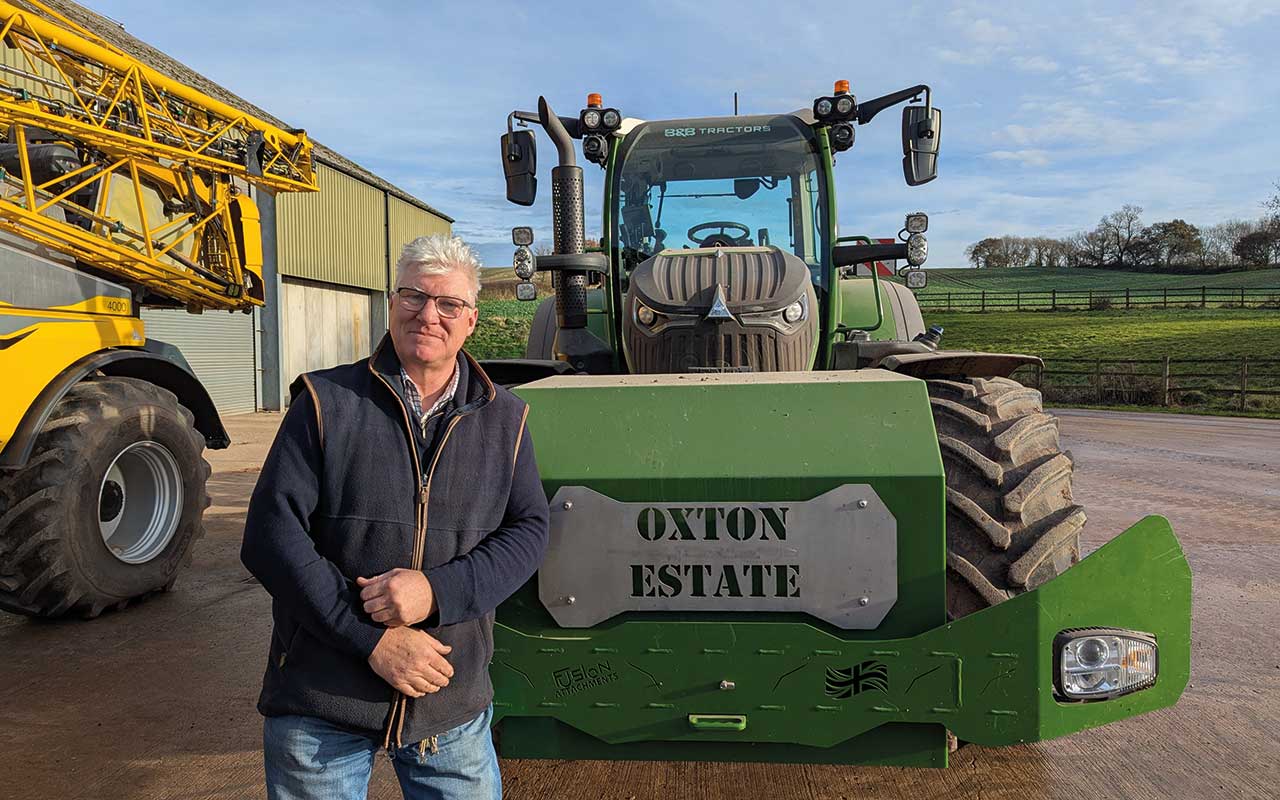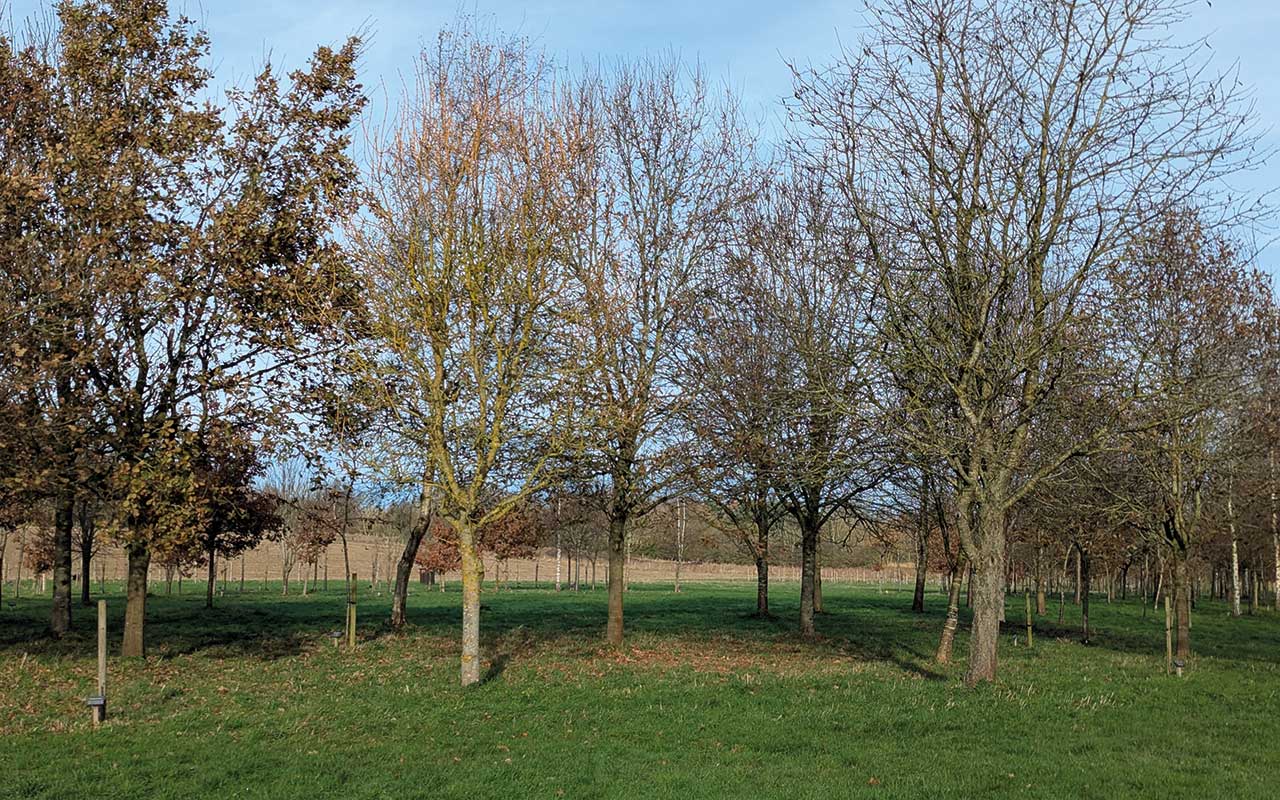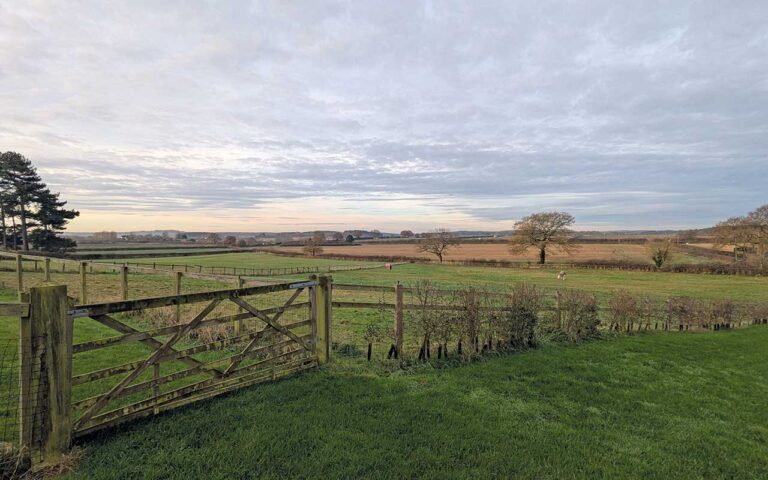Looking at the Oxton Estate as a whole, it is a heavily diversified enterprise, with a golf club, three natural burial grounds (with plans to franchise them across the country), rental properties, Airbnb cottages and a newly established caravan site.
This is without mentioning the green waste processing plant, located next to the farmyard.
The work involved in managing – or at least playing a role – in each of these businesses would be enough for most people. Yet Richard Cross, who was crowned Farm Manager of the Year at the 2024 National Arable and Grassland Awards, says farming remains the core business.

“The estate has been in the same family for 600 years and is run by a trust. Everything from the farm feeds directly into this, so while there are other income streams, none of them can be a crutch to the arable business.”
He joined the estate as farm manager in 2010, before becoming manager of the Oxton Farms Trust and Oxton Contracting in 2016. It was June when he started, and he believes one of the best decisions he made during those first few months was just observing how the farm was run.
“There were three members of staff, with a combined experience of more than 130 years,” he says.
“Everything was planted, and they were preparing for harvest, with plans already in place for the next year’s rotation, so if I had come in and tried to implement changes it would have been chaos.”
Establishment was based around the plough and power harrow, with a Claas 570C combine working at the back end. While Richard could see potential efficiency gains in these areas, his attention quickly fell on the farm’s drying and storage facilities.
“It wasn’t automated, so someone had to constantly be moving back and forth to the drier, and the capacity of our storage meant we almost always had to sell at harvest,” he says. In 2013, he proposed a new 2,200t capacity grain store, along with an automated drier.
This has freed up Richard – who notes he was always the one keeping the drier moving – to get in the tractor cab during harvest.
Splitting the rotation
The estate covers some 1,100ha, with around 730ha put into the arable rotation, and the remainder split evenly between permanent grassland and woodland.
While the ground is connected, creating a loose ringfence, it is split by the main road, which also marks a change in the soil type.
“The bulk of the ground is heavy clay, which then changes to light, easy-to-work sand,” he says. “This means we have to adjust our rotation to suit these conditions.”
On the heavier ground, winter barley, oilseed rape and two years of winter wheat make up the cash crops, with spring barley introduced to handle any blackgrass pressures.
Like for many growers, oilseed rape has been challenging in recent years, with Richard making the decision to halve the area grown. The other half has been put into a three-year legume fallow as part of the Sustainable Farming Incentive.
“It’s an important crop for us, but we lost two crops in the past five years, which is untenable for the amount of ground it was grown on,” he explains. “Now, we look at varieties with plenty of vigour so they can get up and away from the flea beetles. Then it’s a case of managing potential losses from pigeons and game birds.”
On the sandier soils, a shorter rotation has been introduced, with winter wheat, maize grown on contract for a local anaerobic digester, and ground rented out for potatoes, parsnips and carrots. “That land is prone to drought, so there was already irrigation in place.”
Variety choice is key for Richard, who keeps an eye on potential premiums and opportunities to add further value. Group 1 milling wheats are used throughout the rotation, with average yields of more than 9t/ha, with some fields exceeding 11t.
Skyfall is the go-to variety here, which Richard notes is a dirty one but has nothing to match it in terms of yield. Second wheats are normally Extase, which is vigorous and can handle a later drilling date.
He also picks an early-maturing maize variety in an effort to minimise soil damage during harvest.
Since joining the business, Richard has introduced trial plots, with hybrid wheats from Bayer and a slug-resistant variety supplied by Bofin.
“It’s a lot of work to be involved with these trials,” he says. “But there’s a huge potential benefit. You must be involved with things like this or you risk standing still while the industry moves forward.”
He has also tried a series of niche crops in the 14 years overseeing the estate. These included canary seed, which was a loss leader, and soya, which wasn’t suitable for the climate or conditions.
He still has hopes for soya in the UK, though. “It would be a game-changer if we could produce soya at scale here,” he says. “And with gene editing, it’s something we could look at again in the future.”
The right kit
There has been a gradual shift to minimum tillage across the farm since 2010, culminating in the purchase of a 3m Mzuri drill after Cereals 2019. This was combined with the introduction of RTK guidance, section control and variable rate across the mainline tractors.
“The change in the soil has been remarkable,” Richard says. “It has made the ground more resilient, which has helped yields and extended the working window.”
Targeted cultivation is handled by a Mzuri Rehab, but the extreme weather in the past two years has seen the plough brought back out to ensure crops are in the ground. Further adding to the soil quality is 10,000t of green compost, provided by the green waste facility on site.
“Our job is to fill the sheds with a saleable product,” he says. “And that isn’t done year by year; there is a cumulative effect of growing consistent crops. The worst fields this year, by far, are the ones that were left bare last year, so if the plough is needed to get seed into the ground, I’m going to revert to that.”
Another reason for the reintroduction of the plough was the lack of efficacy being seen with the herbicide programme. Blackgrass pressure means the plough is now a key part of establishing the winter barley crops.
A New Holland 8.90 on tracks handles the harvesting, which Richard says offered the best sample, with almost no losses, when they trialled the machine.
“We put it on one of our steepest hills – a hill that we’ve only harvested in one direction in some years,” he explains. “The New Holland went up the hill no problem and when we looked at the field a few weeks later, there wasn’t even a speck of green.”
As for tractors, Richard starts by saying he isn’t keen on a ‘rainbow fleet’, but acknowledges that brand choice has to come down to the operator’s preference as much as the financial considerations.
A Fendt 728 Vario, with the VarioGrip central tyre inflation system, handles the heaviest work, backed up by a John Deere 6R 250, which has been remapped.
Purchases are planned out in advance for big-ticket items, with smaller investments made ad-hoc. While tractors were previously traded in at 6,000 hours, Richard expects this to be extended as the cost of machinery continues to increase.
“We’re now running tractors beyond that, although this has to be balanced because you can take it too far and suffer through the maintenance costs. Our combine stays on the yard for seven seasons, if possible, and other kit will have to be looked at closely going forward.”

Future is diversified
While the farm is the core business for the estate, the diversified interests have been a welcome addition. Each part of the wider group is established as a company so that nothing ever leans on another enterprise.
The natural burial grounds have been hugely successful, Richard explains, offering meadow and woodland plots for both burials and ashes, with three sites now managed by the estate. Elsewhere, the new caravan site is now accepting guests.
Richard notes that it was primarily purchased as the site was the only field within the ringfence not owned by the estate, but after a year of investment, he hopes it will be successful.
For the future, there are plans for a small artisan shopping centre, which will not only be a viable enterprise through rent but could also have implications for the farm.
“There are plans for a bakery there, with facilities to hold classes,” he says. “This would give us another potential market for our wheat, and perhaps provide opportunities for milling our own produce and creating additional value that way.”


